
Interview with a Bookstore:
Romania's At Two Owls
When Best Friends Open a Bookstore
At Two Owls Bookstore, located in Timișoara, Romania, is an independent initiative of two lifelong best friends, Oana Doboși Potcoavă and Raluca Selejan, who answered these questions.
What would you say is your bookstore’s specialty?
Being friends since we were 10 and being passionate about books and literary life, it was the natural course of action for us to open an independent bookstore in our hometown. It is because of this we are the kind of bookstore that, through books and literature, is creating new friendships in a way similar to our own.
The idea was to open an independent bookstore where you want to come in, take a book from the shelf, read a few pages sitting next to a specialty coffee, then buy it and take it home with you. We wanted to create a place where anybody can feel like they’re at home, to have a cozy and inviting atmosphere and act as a meeting point for artists, writers, readers and art lovers.
If you had infinite space what would you add (other than a bar/restaurant)?
That’s something we fantasize a lot about: to have more rooms for our books. One room for social sciences, so literature books can have more space in the events area, one for literary criticism and another for secondhand books. One more so that poetry and theater can have their own room without being divided across the walls, a room for the memoirs and biographies, another one for English books and an even bigger room for children.
And, since we excel at imagining things, we also want a bookstore that can expand and shrink its walls so when people come to our events and we don’t have a space inside anymore we can make the space for them.
What’s the craziest situation you’ve ever had to deal with in the store?
Just in case you didn’t know, we almost were the only public place that played in a world premiere event “Helen’s Theme, Incidental Music” by Leonard Cohen.
The story goes: two years back, an event was set to launch the second edition of a book on Leonard Cohen written by Mircea Mihăieș, a literary critic and a literature professor at the Faculty of Letters in Timișoara. A week before the event, he found a cassette that was given to him by Leon Wieseltier with homemade recordings by Leonard Cohen for his album, “The Future.” On the cassette, there was a song called “Helen’s Theme, Incidental Music,” that later became “Tacoma Trailer.”
He brought the cassette and we managed to find a cassette player (thanks to our friend Mircea). We tested it out by listening to a minute of one song, being too scared of doing any damage to the cassette. Then, we wrote a new press release and we posted the news in the Facebook event.
The day of the event, the bookstore was full. That’s when something crazy happened. We were playing the cassette when Mr. Mihăieș said, ”It’s not this song,” playing it forward. He repeated it – “it’s not this song,” “it’s not this song,” so on so forth until he said, ”That’s it, we don’t have the song, thank you for coming tonight.”
A couple of weeks later, he called us and said: “Listen to this.” It was the song, but on the other side of the tape.
What’s been the biggest surprise about running a bookstore?
Something every bookseller knows, and something we didn’t know before we opened, is how little time for reading you have at work. This is one of the most common myths that surround the romanticized view on owning or working in an independent bookstore. We learned that you hardly ever read in the bookstore. It’s like what Harold Bloom says about the act of reading, that “it remains a solitary activity in excellence,” and that’s because you either deal with customers who cross your threshold, or you’re dealing with the administration and arranging of books. But “reading is the most human of creative activities,” as Alberto Manguel says in the introduction of Into the Looking-Glass Wood: Essays on Words and the World, and that comes with a lot of author events and reading clubs and book launches.
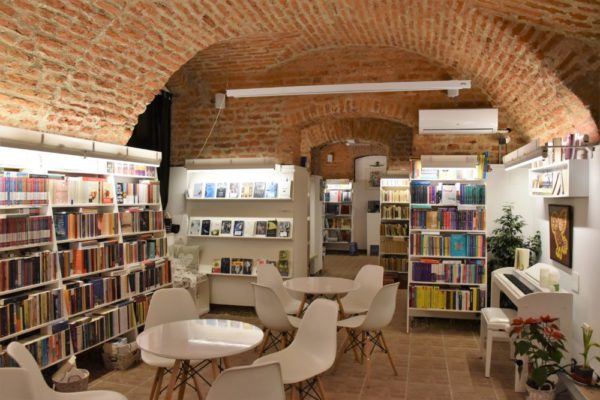
What’s the book you want to bring back into print? Your most-requested out of print book?
Since we opened in December 2016, our customers asked a lot about a book that hadn’t been published into Romanian since the 60s. The book was The Bridge on the Drina by the Yugoslav writer Ivo Andrić, which won the Nobel Prize in Literature in 1961. But last year, in August, the book was published by one of the largest publishing houses in Romania, Polirom. In September it was the book of the month at our bookstore. We organized an event around it and we promoted it as much as we could. Since then, our customers have requested more writers from the ex-Yugoslav space.
What’s your message to Amazon (and Amazon customers)?
Romania has a population of 19 million people, with the book market approximated at 60 million Euros, and yet it has only around 200 bookstores around the country. As a small independent bookstore in Timișoara, we were facing a high risk by opening, even though we don’t have Amazon (but we do have similar e-commerce). We want to believe that we changed people’s opinions about why you should support the market by buying books and supporting physical bookstores. This is something we believe in and also is a kind of statement that if you do what you love and are truly passionate about it, you can change things in your community.
Why should you come and buy books from the bookstores? Because in this world that lives on speed and in an age where we spend more of our time online than we do away from the internet, you should find the time to visit your local bookstore and give yourself the opportunity to browse the shelves and the staff recommendations and talk to your bookseller. It is a healthier and enjoyable experience that is both real and welcoming, unlike shopping from a screen. You have to give yourself this freedom.
How do you use the bookstore to build community?
We organize literary events with local, national and international writers (for example, we had the Icelandic writer Jón Kalman Stefánsson at our 2-year anniversary) and we host or organize a lot of events for children. Since the day we opened we have a Story Hour event every Sunday at noon with a different reader every week. Thanks to this, we have seen children growing up and being more curious about books. We organize events where children are presenting books to other children so that way, we can encourage them from a young age to read and talk about books as well as making friendships and growing more confident.
We have partnerships with local NGOs, cultural institutions from the city, and with schools that are coming to the shop to organize events. We also try to partner up with local festivals and events, to bring books outside the bookshop so participants can stumble upon them as much as possible.
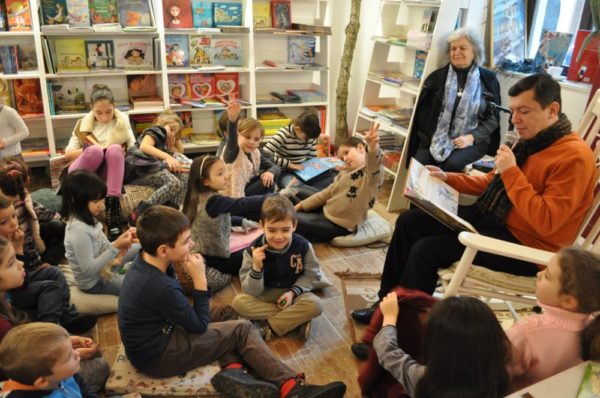
And then something wonderful happened in 2017. Customers asked if we had some volunteering opportunities because they wanted to be more involved in the bookstore and give us a hand. So we developed this volunteering program where we had, and still have, people coming and working side by side with us. We had pupils volunteering during summertime and during school days and of course, the schedule is set with them and their parents so they have time for homework too. We also have an agreement with the Faculty of Letters from our city, so that students can come for their mandatory internship.
Looking back at the short time that passed since we opened, we think that the community created around the bookstore is an equal effort made by us and our customers and that is, simply put, something beautiful to be thankful for.
What’s a children’s book that you think all adults should read?
We try to keep up with what’s happening around the world with children’s books, but regardless how many of them we read, there are two classics that we believe all adults should read: The Happy Prince by Oscar Wilde so we can be reminded not to fall for appearances and that we need to care for others and The Little Prince by Antoine de Saint-Exupéry so we can remind ourselves to cherish our friends, to be brave and to try not get trapped in adult life.
What’s your favorite book to handsell?
First as readers and second as booksellers, we think it’s unfair to so many books and writers to pick only one. Generally speaking, we can say that we love to handsell literary fiction by Romanian and foreign writers. Most of the time, our top-selling books aren’t the same with the chain bookstores or online shopping websites, which is perfectly normal and defines what being an independent bookstore means. It depends on what we’re reading, what’s being recently translated or published, on what are our interests in a certain period of time. Some of our favorite books to handsell are the ones from the staff’s recommendation shelves. We’re excited to find others with whom you share the curiosity of the same book.
What’s your favorite section of the store?
We’d like to point out the staff’s recommendation shelves. Our team is important for the bookstore and each one of us has our own shelf with the books that we recommend. It’s kind of funny to know what happens behind the scenes when a book is taken from the recommendation shelf: we start asking each other who bought it, how did the person look, if he or she is a regular or not, if he or she said something about why they bought it, and so on and so forth. So please, try our recommendations, we’re going to be asking who you are, why you took it and fantasize about your life!
![]()
Shelf Talkers
Written by the At Two Owls Staff and Community
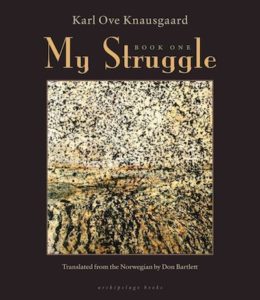
Karl Ove Knausgård, My Struggle I-VI
It’s impossible for me to recommend just one volume of My Struggle because I see all six volumes as an indivisible whole. Why read a 3,770-page novel about the life of a writer called Karl Ove Knausgård, which is not written in chronological order, but which starts with the death of his father? One possible answer may be that, once you gain access to the life of a son, brother, friend, husband, father, child, teenager and novice writer called Karl Ove Knausgård, depicted with all the myriad details that bring authenticity to one’s utmost thoughts and feelings, you gain the impression that you know everything about this person, yet without actually knowing him at all. Whether we acknowledge it or not, we all like to read about the private lives of others; there is a certain dose of mystery involved, perhaps because we feel that we will never know the truth behind the written page, yet we can ceaselessly imagine what their lives may look like. Karl Ove Knausgård gives us the opportunity to see his autobiographical novels as a form of reinvented life.
–Oana Doboși-Potcoavă
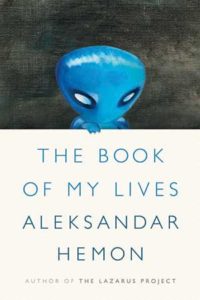
Aleksandar Hemon, The Book of My Lives
“So I say I am complicated. I’d also like to add that I am nothing if not an entanglement of unanswerable questions, a cluster of others.” I believe that we, as readers, are alike, at least as far as the books we read are concerned, even if we are not Aleksandar Hemon and we cannot write like he does. This is why I recommend his memoir: the world Hemon describes is our world, full of all kinds of conflicts–of those who have been willingly or unwillingly exiled, of those who have been uprooted or those who are in search of meaning, of life or of an identity. His humor and his (self-)irony that help us pass through the most difficult and uncertain moments of the story are the elements that bring out a smile on our face and compel us to turn one page after another, as we inch closer and closer to the book’s ending.
–Raluca Selejan
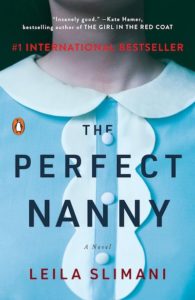
Leïla Slimani, The Perfect Nanny
Even though you can read the ending in the first two paragraphs, you still want to read the whole book, hoping it will be different and thinking you may have misunderstood those paragraphs. The plot doesn’t stand out much; Myriam, a mother of two, hires a nanny, despite the fact that her husband opposes the idea, so she can go back to how life was before motherhood. The nanny, Louise, enters the family and everything changes. This is mainly because of the wonderful writing of the author, who succeeds in highlighting a lot of human traits and reactions and emphasizing the complications of human beings. The book caused me a lot of anguish and I empathized with Myriam throughout the whole novel. It was a therapeutic reading for me, maybe it will be the same for others.
–Livia Hektor

Dubravka Ugrešić, Baba Yaga Laid an Egg
Recommending a good book is not an easy task because on one hand you love it so much that you cannot find the right words to talk about it and on the other hand it is usually much more than a mere story. Both reasons apply in the case of Baba Yaga Laid an Egg by Dubravka Ugrešić, a witty novel, marvelously structured, in which femininity, folklore, and sorcery are used to define not only the former Yugoslavia and Central Europe but an entire world. To say that this novel is brilliant is not an exaggeration; it is the honest and normal reaction of a reader who has just read it.
–Snejana Ung
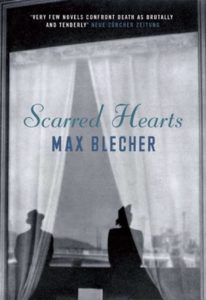
Max Blecher, Scarred Hearts
I would like to recommend Scarred Hearts, a novel by Max Blecher, first published in 1937. The English version was published by Old Street Publishing, based in London, 2008. A Romanian writer of Jewish descent, Blecher died at 29, suffering from spinal tuberculosis. His illness condemned him to living in a plaster corset, just like his alter-ego, Emanuel. Struck by tuberculosis, Emanuel becomes a patient of the sanatorium in Berck-sur-Mer, France, and tries to adapt to his new existence, trapped in a plaster cage like Kafka’s character Gregor Samsa is trapped in the body of a huge insect in The Metamorphosis.
–Alexandru Potcoavă
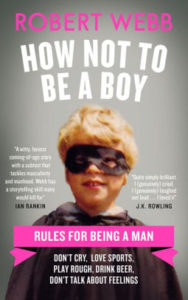
Robert Webb, How Not to Be a Boy
One of the books that I often come back to is Robert Webb’s How Not to Be a Boy. I love to re-read it or recommend it for pure pleasure or to remind myself and others of how important it is to talk about gender issues. Inspired by Caitlin Moran’s manifestos, How Not to Be a Boy is written with a deep understanding of the power of comedy (Webb is an actor), but also with a delicate force to make one cry, bringing out vulnerabilities and grief, from a Narnia-like wardrobe. The memoir has something of Safran Foer’s wittiness in Extremely Loud and Incredibly Close, adding to it a next level of sensitivity, which is, no less than Orhan Pamuk would write in The Black Book, “as surprising as life.”
–Diana Rusu



















